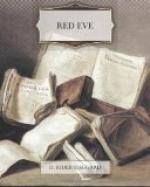So they went up the stairs and turned down a long passage, into which the light flowed dimly through large open casements.
“Who is that?” asked Hugh suddenly. “I thought that one brushed past me, though I could see nothing.”
“Ay,” broke in the lad David, who was following, “and I felt a cold wind as though some one stirred the air.”
Grey Dick also opened his lips to speak, then changed his mind and was silent, but Sir Andrew said impatiently:
“I saw no one, therefore there was no one to see. Enter!” and he opened the door.
Now they found themselves in a lighted room, beyond which lay another room.
“Bide you here, Richard, with your companion,” said Sir Andrew. “Hugh, follow me, and let us learn whether I have trusted to God in vain.”
Then very gently he opened the door, and they passed in together, closing it behind them.
This is what Hugh saw. At the far end of the room was a bed, near to which stood a lamp that showed, sitting up in the bed, a beautiful young woman, whose dark hair fell all about her. Her face was flushed but not wasted or made dreadful by the sickness, as happened to so many. There she sat staring before her with her large dark eyes and a smile upon her sweet lips, like one that muses on happy things.
“See,” whispered Sir Andrew, “she is awakened from her swoon. I think I did not trust in vain, my son.”
She caught the tones of his voice and spoke.
“Is that you, Father?” she asked dreamily. “Draw near, for I have such a strange story to tell you.”
He obeyed, leaving Hugh in the shadow, and she went on:
“Just now I awoke from my sleep and saw a man standing by my bed.”
“Yes, yes,” Sir Andrew said, “the physician whom I sent for to see you.”
“Do physicians in Avignon wear caps of red and yellow and robes of black fur and strings of great black pearls that, to tell truth, I coveted sorely?” she asked, laughing a little. “No, no. If this were a physician, he is of the sort that heals souls. Indeed, now that I think of it, when I asked him his name and business, he answered that the first was the Helper, and the second, to bring peace to those in trouble.”
“Well, daughter, and what else did the man say?” asked Sir Andrew, soothingly.
“You think I wander,” she said, interpreting the tone of his voice and not his words, “but indeed it is not so. Well, he said little; only that I had been very ill, near to death, in truth, much nearer than I thought, but that now I should recover and within a day or two be quite well and strong again. I asked him why he had come to tell me this. He replied, because he thought that I should like to know that he had met one whom I loved in the city of Venice in Italy; one who was named Hugh de Cressi. Yes, Father, he said Hugh de Cressi, who, with his squire, an archer, had befriended him there—and that this Hugh was well and would remain so, and that soon I should see him again. Also he added that he had met one whom I hated, who was named the lord of Cattrina, and that if this Cattrina threatened me I should do wisely to fly back to England, since there I should find peace and safety. Then, suddenly, just before you came in, he was gone.”




